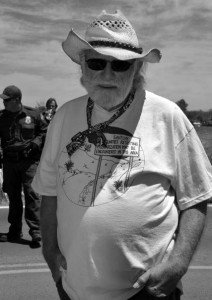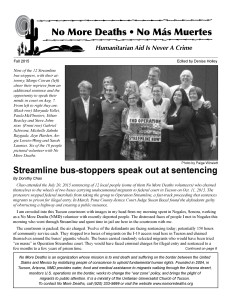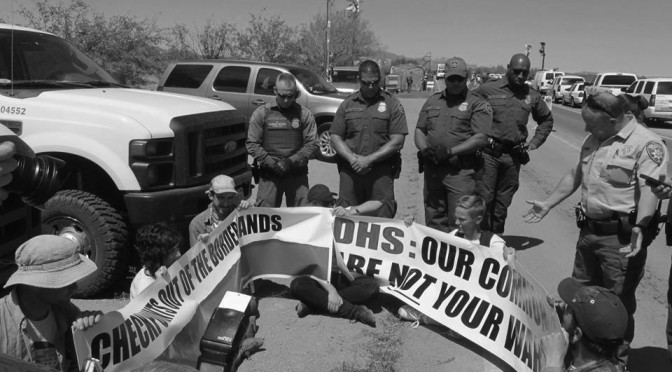This article appears in our fall newsletter.
Some 100 Arivaca residents and supporters gathered at 10 a.m. May 27 and peacefully proceeded to the Border Patrol checkpoint on Arivaca Road to demand its removal. Upon entering the checkpoint, they were met with a blockade of armed Border Patrol agents who used physical force, attempting to move the residents back.
Despite this intimidation, protesters held their ground and sat in while community members held a public hearing to call for the removal of the checkpoint.
“Because of our brown skin, me and most of my family have to reach into our pockets for ID at the checkpoint to prove that we’re legal citizens in our own town. I’m sick of it.”—Carlotta Wray
At the protest, local business leaders, parents, seniors and youth cited widespread abuse and harassment, rights violations, racial profiling, and economic deterioration as direct results of the checkpoints placed on all outbound roads from the small rural community.
“Our reverse-gated community is a barrier to tourists … this checkpoint is choking our community,” said business owner Maggie Milinovich.
Carlotta Wray spoke about her experiences being racially profiled by Border Patrol. “Because of our brown skin, me and most of my family have to reach into our pockets for ID at the checkpoint to prove that we’re legal citizens in our own town,” she said. “I’m sick of it.”
Patty Miller described the ongoing military-style presence of Border Patrol in the Arivaca community as “a war zone all the time.”

Community members called on US Rep. Raul Grijalva to keep his promise to hold a federal hearing on the issue before Department of Homeland Security (DHS) officials.
The Arivaca protest was part of the Border Communities Day of Action for demilitarization. That same day, communities across the state held demonstrations against border militarization, including Ajo, Bisbee, Patagonia, and Sells on the Tohono O’odham Nation.
The coalition of autonomous community groups called on DHS to stop the spread of military infrastructure that degrades residential life in the border region. They asked for removal of surveillance towers, inland checkpoints and walls and respect for indigenous sovereignty, environmental regulations, and the separation of local and federal policing powers.
Together, these actions put forth a strong local vision of a demilitarized US–Mexico border.
Read next story:
NMD branches out to reach more migrants

Featured photo: Residents of the small border town of Arivaca, Arizona confront Border Patrol agents at a checkpoint they must pass through to leave town during a protest on May 27. Photo provided by People Helping People.

